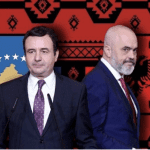By ANDI BALLA
The recent Albania-Italy bilateral deal aimed at processing irregular migrants and refugees rescued in the Mediterranean in camps within Albanian territory under Italian extraterritorial jurisdiction has sparked intense debate in both countries and beyond.
However, a closer examination of the deal reveals some critical points that call into question both its implementation and effectiveness. Thus, there is a good chance the agreement will never be fully implemented — likely not at all and certainly not in the large numbers we’ve seen in the media. Thus, there are other reasons behind its signing.
One cannot ignore the possibility that the primary objective of this deal is to shape a particular narrative rather than being a concrete plan for action. The publicity surrounding the agreement may serve as a deterrent for would-be irregular migrants and refugees who risk their lives to reach the EU via dangerous sea voyages in the Mediterranean.
The story being told to would-be irregular migrants by those behind the deal is simple: You are not going to the wealthy EU and freedom, but rather to a closed camp in a poor non-EU country. So why even take a risk? It is worth noting that Italy initially sought a North African country for such an arrangement but failed to secure any deals.
For those behind the deal, that narrative is just as important to reach the political base of the current Italian prime minister as it is for the desperate migrants hoping to reach Italy’s shores. Italian Prime Minister Georgia Meloni came to power with promises of addressing the migration crisis decisively and may view this agreement as an opportunity to score a win with her base. It allows her to demonstrate action on the migration issue, which has plagued many of her predecessors as well.
Even if the deal is intended to be more than a publicity stunt, numerous challenges make its implementation highly doubtful. The European Union, Albania’s Constitutional Court, and even elements of the Italian state could potentially hinder or even halt the agreement.
Activists on both the European human rights front and within the Albanian opposition are likely to contest the deal vehemently. The extraterritorial component of the deal may face domestic and international legal scrutiny, raising concerns about its overall feasibility.
The absence of prior consultation with EU officials raises eyebrows and suggests a lack of endorsement from Brussels. As the deal unfolds, EU officials may express strong reservations or even exert pressure to force Albania to reconsider its participation. The European Union, already dealing with complex challenges in the Western Balkan region, may not be eager to add another headache in the mix.
Furthermore, the deal was presented as a fait accompli by the two prime ministers, and Albanian institutions and people were not consulted, leaving them with unanswered questions about the potential impact on their country and society.
Moreover, the practicality of turning Albania into an effective solution for managing EU migration is doubtful at best, as implementing such a plan would require significant resources and infrastructure that are impossible for Albania and probably too costly for Italy.
A comprehensive and collaborative approach to addressing irregular migration to the EU is necessary, taking into account the interests of host countries and the rights and dignity of migrants.
A camp in Albania to process Italy-bound asylum seekers is clearly not a practical solution, but it does make for a good anti-migration publicity stunt.










